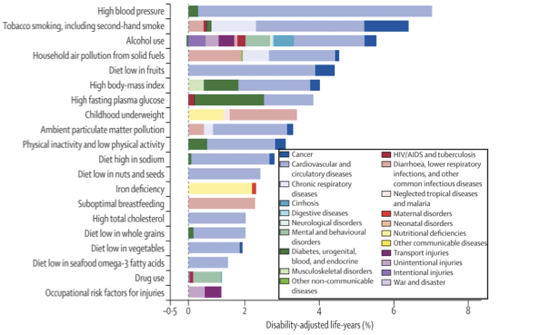Global burden of disease
Causes of death. Crunching the
numbers – and what results
Access pdf of Lancet paper on Global Burden of Disease here
Access pdf of this month's Philip James column here
Access pdf of this month's WN editorial here
London. Our news team reports. Results of the biggest study ever on the leading causes of death worldwide were published in The Lancet in mid-December. The work has been carried out by the Seattle-based, Gates Foundation-funded Institute for Health Metrics and Evaluation, headed by former WHO official Christopher Murray. Two findings of the study are first, that chronic non-communicable diseases are now the leading causes of death, and second, that on average people are living longer, but are living with disease for more years before death. Christopher Murray says: 'We're finding that very few people are walking around with perfect health and that, as people age, they accumulate health conditions. At an individual level, this means we should recalibrate what life will be like for us in our 70s and 80s. It also has profound implications for health systems as they set priorities'.
Majid Ezzati of Imperial College London, another of the study's lead authors, says: 'We have gone from a world 20 years ago where people weren't getting enough to eat to a world now where too much food and unhealthy food – even in developing countries – is making us sick'. Not for all populations in lower-income countries, of course.
One of the key Lancet papers lists the 20 leading causes of death worldwide identified by the study. As the figure below shows, a total of 14 are linked in some way to food, diet and nutrition. Some of the results shown in the figure, such as the importance of smoking and other use of tobacco, alcohol abuse, and high body mass index (obesity), are not surprising. Other results, such as the high position of diet low in fruit and diet low in nuts and seeds, and precedence given to diet low in fruit compared with diet low in vegetables, are startling. Other factors usually regarded as important, such as diet high in trans fatty acids and diet high in sugar-sweetened drinks, do not rank in the 'top 20' list.
Figure 1
The top 20 determinants of global deaths, 2010
Outcome of Institute of Health Metrics and Evaluation methodology

Philip James, commenting in his column this month, says: 'The positioning of diet low in fruit as number 4 in the list, is surely strange. The remarkable impact of excess weight has been repeatedly highlighted in practically every analysis ever made, whether involving cohort studies, physiological experiments, detailed intervention trials, or long term analyses of mortality… But the position of fruit is not the only startling judgement. Diet low in nuts and seeds is judged to be the 12th most important risk factor in the world for ill-health, disease and premature death, with 2 million deaths attributed every year. Really? Although previous analyses and collations of data by WHO expert groups have considered some of the valuable nutrients contained in nuts such as omega-3 fatty acids, suddenly to identify out of the blue a new group of foods as in effect causally related to huge burdens of disease and premature mortality is astonishing'.
This month's World Nutrition carries an editorial comment, saying: 'Another judgement made by the GBD study, that diet low in seafood omega-3 fatty acids cause over 1.3 million deaths a year also from coronary heart disease, also based on analysis of surveys assessed in the US, is also impressive… But if the implication of this judgement is that most people should consume more fish, how can this be reconciled with the fact that the world's ocean fish stocks are already grossly over-exploited and even perhaps liable to irreversible decline?'
To date it has been the task of relevant UN agencies to set global standards. In the case of health and disease the agency responsible, on behalf of member states, is the World Health Organization, which welcomed the Institute for Health Metrics and Evaluation at its inauguration in 2007.
In a speech made in Seattle at the Institute in March 2011, The Lancet editor Richard Horton pointed that global health research is now dominated by the US, and that resources are being drained away from publicly funded universities, research centres and multilateral organisations such as within the UN system. He also worried about the relative weakness of European health research, bearing in mind the long-established sets of European values concerned with health. He identified as 'weird' that the center of gravity in global health research is increasingly shifting away from the traditional multilateral institutions of public health based in Europe and is increasingly dominated by American academic institutions, and wondered if this represents a 'transformational shift'. He urged that the global health community come together to establish priorities and agree on how to evaluate progress.
So, what now? Will the results of the Global Burden of Disease Study, with its implications for new policies on fruit and nuts, with lower priority for trans fatty acids and sugared drinks, now change international policy and action priorities? Or will some of its assumptions and findings be cogently challenged? This remains to be seen.






